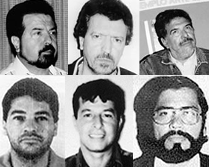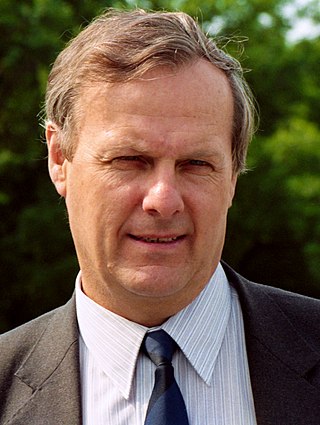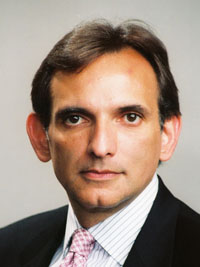
The Cali Cartel was a drug cartel based in southern Colombia, around the city of Cali and the Valle del Cauca. Its founders were the brothers Gilberto Rodríguez Orejuela, Miguel Rodríguez Orejuela and José Santacruz Londoño. They broke away from Pablo Escobar and his Medellín associates in 1988, when Hélmer "Pacho" Herrera joined what became a four-man executive board that ran the cartel.
The Russian mafia, otherwise referred to as bratva, is a collective of various organized crime related elements originating in the former Soviet Union (FSU). Any of the mafia's groups may be referred to as an "Organized Criminal Group". This is sometimes modified to include a specific name, such as the Orekhovskaya OPG. Sometimes, the Russian word is dropped in favour of a full translation, and OCG is used instead of OPG.

Boris Vyacheslavovich Gryzlov is a Russian politician currently serving as the Russian Ambassador to Belarus. Previously, he served as the chairman of the State Duma from 2003 to 2011 and as interior minister from 2001 to 2003. He was also the leader of the ruling United Russia party.

Galina Vasilyevna Starovoitova was a Soviet dissident, Russian politician and ethnographer known for her work to protect ethnic minorities and promote democratic reforms in Russia. She was shot to death in her apartment building in 1998.

Anatoly Aleksandrovich Sobchak was a Russian politician, a co-author of the Constitution of the Russian Federation, and the first democratically elected mayor of Saint Petersburg.

Michael Cherney is an Uzbek-born Israeli entrepreneur and industrialist. He is known for his significant role in the 1990s aluminium industry in Russia, and his business ventures in Israel. He is also the founder of the Michael Cherney Foundation and a sponsor of The Intelligence Summit.

Leonid Dodojonovich Reiman is a Russian businessman and government official, former Minister of Communications and Information Technologies of the Russian Federation. He has the federal state civilian service rank of 1st class Active State Councillor of the Russian Federation.

Yury Yakovlevich Chaika is a Russian lawyer and statesman who currently serves as the Presidential Envoy to the North Caucasian Federal District since 2020. He previously served as Prosecutor-General of Russia from 2006 to 2020 and Minister of Justice from 1999 to 2006.

Alexander Glebovich Nevzorov is a Russian and Ukrainian television journalist, film director and a former member of the Russian State Duma.
Roman Igorevich Tsepov was a Russian businessman and confidant to Vladimir Putin during Putin's work at the Saint Petersburg City Administration. Tsepov was suspected of criminal and corruption activity.
Ozero is a dacha cooperative in northwest Russia associated with Vladimir Putin's inner circle.

Viktor Petrovich Ivanov is a Russian politician and businessman, former KGB officer, who served in the KGB Directorate of Leningrad and its successors in 1977–1994. He was the director of The Federal Narcotics Service of Russia from 2008 until 2016.
The Tambovskaya Bratva is a large gang in Saint Petersburg, Russia. According to common allegations, it was organised in Leningrad in 1988 by two men from Tambov Oblast, Vladimir Kumarin and one from St. Petersburg. The gang is named after their region of origin. Despite allegations, Kumarin continues to deny his involvement. Originally the gangsters were recruited from people of Tambov origin and sportsmen, and were engaged in a protection racket.

The Petersburg Fuel Company is an open joint-stock company of Saint Petersburg, Russia, founded in September 1994, after a fuel supply crisis had hit the city hard. The company specializing mostly in gasoline refining, storage, transportation and retailing. Since 2001, PTK has been an open joint stock company. In 2001 the company was restructured as an open joint-stock company, and became a subsidiary of St. Petersburg City Bank.
Vladimir Alexeyevich Smirnov is a Russian scientist, and businessman. Between 2002–2007, he was the director general of Tekhsnabexport (TENEX) which carries out export of goods and services produced by Russian nuclear enterprises. During his tenure at Tenex, Smirnov contributed to reducing the threat of nuclear proliferation through the elimination of weapons-grade uranium and its transformation into electricity-producing fuel.
Yury Titovich Shutov was a Russian politician who is known for collecting incriminating evidence against Vladimir Putin at the time when Putin worked as an aid of the former Saint Petersburg Mayor Anatoly Sobchak. Shutov was convicted to life in prison on criminal charges that have been allegedly fabricated to punish him for making public accusations of Putin.

Alexander Ivanovich Bastrykin is a Russian lawyer and official who has served as the Chairman of the Investigative Committee of Russia since 15 January 2011. He served as the First Deputy Prosecutor General of Russia and Chairman of the Investigative Committee of the Prosecutor General's Office from 2007 to 2011.

Carlos Pascual is a Cuban-American diplomat and the former U.S. Ambassador to Mexico and Ukraine under President Barack Obama and Bill Clinton respectively. He served at the U.S. Agency for international Development from 1983 to 1995, and at the White House National Security Council from 1995 to 2000, ultimately as senior director for Russia, Ukraine and Eurasia. He was the State Department Coordinator for U.S. Assistance to Europe and Eurasia, and subsequently the Coordinator for Reconstruction and Stabilization from 2003 to 2005. Later he served at the Brookings institution and was appointed Special Envoy and Coordinator for International Energy Affairs at the State Department's Bureau of Energy from 2011 to 2014.

Parex Bank was a Latvian bank founded in 1992 by Valērijs Kargins and Viktors Krasovickis as a privately owned full-service banking company in Riga, Latvia that was very dominant in currency exchange in the 1990s. It had local and international clients in both the West and Russia with close ties to the Tambovskaya Russian mafia in St Petersburg and Vladimir Putin.
Sergei Borisovich Korolev is a Russian intelligence officer currently serving as first deputy director of the Federal Security Service (FSB). He previously served as head of the Economic Security Service of the FSB from 2016 to 2021. A secretive figure with extensive connections to the Russian mafia, he is considered one of the leading candidates to succeed Alexander Bortnikov as director of the FSB. He has held the military rank of Army General since 2021. As a result of the Russian invasion of Ukraine, he was sanctioned by the EU, Australia, Belgium, Canada, Estonia, France, New Zealand, Switzerland, the United Kingdom, and Ukraine.